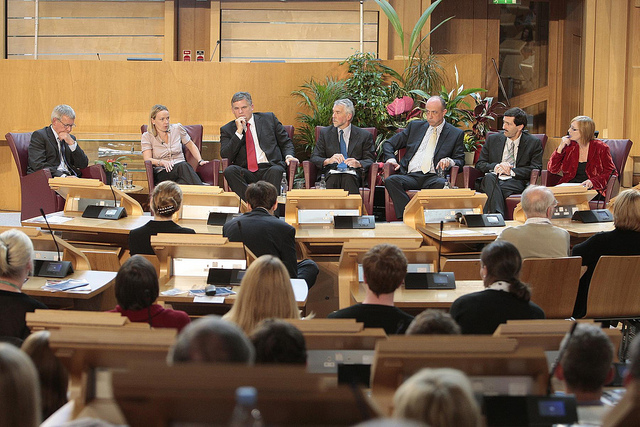The Scottish Parliament should not have sovereign power because it serves the Scottish Government rather than holding it to account
The closest thing that the UK has to a written constitution is the legal and political fact of the sovereignty of the Westminster Parliament, something which remains the case in Scotland even since the creation of the Scottish Parliament in 2001. However, recent events, according to Norman Bonney, show that the subordination of the Parliament to the Government since the SNP’s rise to power have shown it to be unsuitable as a sovereign body in the event of a ‘Yes’ vote in September’s independence referendum.

An out-of-session debate in the Scottish Parliament chamber, chaired by the SNP Presiding Officer Tricia Marwick (Credit: General Teaching Council, CC BY NC ND 2.0)
The primary purposes of the SNP Scottish Government (as a minority administration from 2007, and a majority one since 2011) have been to demonstrate that the party can lead a competent government and to secure the establishment of Scotland as an independent state – with the latter cause always being given the greater weight.
The decision in 2011 of the new elected SNP majority to vote in one of their members as Presiding Officer broke with the practice whereby in the previous two parliamentary sessions, 2003-7 and 2007-11, this office was held by MSPs who were not members of the governing coalition parties – respectively an SNP member, George Reid, while there was a Scottish Labour/Liberal Democratic coalition Executive and a Conservative, Alex Fergusson, during the latter period of SNP minority government. For the first time in the history of the Scottish Parliament there was, in 2011, single party majority control and the decision to elect one of the SNP majority members as Presiding Officer signalled the determination of the ruling party to secure its goal of achieving independence through a referendum – even at the cost of casting doubt on the neutrality and independence of the office holder whose responsibility is to clearly demarcate the boundaries of government and parliament.
The election of a Presiding Officer, who might at critical times make decisions favourable to the cause of the SNP, rather a member of another party who might be more demonstrably independent, was a cause for concern for those who value parliamentary independence from the executive. The new incumbent, Patricia Marwick, suspended her membership of the SNP for the duration of her term in office, but there is further cause for concern evident in an informative online BBC feature about her and her duties which states that ‘The scope of the job is massive, from seeing government policy through the legislative process to the administration of the parliament and its people’
Combined with her previous role as SNP Business Manager, which the article sees as an asset in the new role, the emphasis of the first part of this quotation suggests that there is a bias towards securing the implementation of the programme of the Scottish Government – a perspective which was certainly not challenged in the report by the interviewee – rather than a focus on the most important task of Parliament of holding Government to account and subjecting its key policies to profound scrutiny.
The fact that several of the Parliament’s committees also have SNP majorities and convenors is a further example of how the critical function of Parliament can be suppressed by a determined majority party. A recent case of a committee acting as a cheerleader, rather than as a forum for reasoned assessment of policy occurred, during proceedings of the European Committee on 12 June 2014 when a professor of constitutional law felt that his observations on issues concerning the Scottish Government proposals for independence were shouted down by an SNP member of the Committee and terminated by the SNP committee convenor.
If independence comes (although polls consistently suggest that this will not be the outcome of the referendum) the SNP would be well placed to secure another majority in the Scottish Parliament elections of May 2016, further reinforcing, during a period of probably continuing critical negotiations with the UK Government over independence terms, the developing culture of subservience of the Scottish Parliament to the Scottish Government.
As a potential citizen of a newly independent Scotland I will not be confident to vote ‘yes’ to an independent Scotland in the referendum of 18 September 2014 to entrust sovereign power to a legislature that has not demonstrated its independence of control by the executive and which lacks experience of the fundamental issues of foreign policy, defence, macro-economic management, treasury, currency and international affairs and other matters which will fall its way should there be an affirmative vote for independence.
—
Note: this post represents the views of the author, and not those of Democratic Audit or the LSE. Please read our comments policy before posting. The shortened URL for this post is: https://buff.ly/V8U1Lw
—
 Norman Bonney was a lecturer and researcher at Aberdeen University and, The Robert Gordon University, Aberdeen. He was head of psychology and sociology at Edinburgh Napier University, where he is currently Emeritus Professor. His ‘Monarchy, religion and the state; civil religion in the UK, Canada, Australia and the Commonwealth’ was published by Manchester University Press in October 2013. Further details can be found here. His recent publications are listed here.
Norman Bonney was a lecturer and researcher at Aberdeen University and, The Robert Gordon University, Aberdeen. He was head of psychology and sociology at Edinburgh Napier University, where he is currently Emeritus Professor. His ‘Monarchy, religion and the state; civil religion in the UK, Canada, Australia and the Commonwealth’ was published by Manchester University Press in October 2013. Further details can be found here. His recent publications are listed here.
.





 Democratic Audit's core funding is provided by the Joseph Rowntree Charitable Trust. Additional funding is provided by the London School of Economics.
Democratic Audit's core funding is provided by the Joseph Rowntree Charitable Trust. Additional funding is provided by the London School of Economics.
Why the Scottish Parliament should not have sovereign power #indyref #politics https://t.co/fEkhyz9RMW
The Scottish Parliament shouldn’t be sovereign as it serves the Scottish Government rather than holding it to account https://t.co/PZMdWlTylE
This article highlights a problem with many single chamber legislatures where the executive is drawn from its membership.
Concerns about such a situation might be a good reason for saying that you will vote “no”, but it does raise again the general question of how to avoid the “tyranny of the majority”. At least in Holyrood a parliamentary majority is more likely to be a reflection of a popular majority.
(That some in the media cannot tell the difference between parliament and government is a shame, but probably reflects a similar public confusion. But is the confusion a result of the media?)
Under SNP weak Scots Plmt controlled by Scots Govt and thus not fitted to hold sovereign power #indyref https://t.co/Uqxhv4mfR6 #politics
Norman Bonney argues Scottish Parliament doesn’t hold Scottish Government to account enough, but serves it https://t.co/4e2VDOSeiV
The Scottish Parliament should not have sovereign power because it serves the Scottish Government rather than… https://t.co/a1A0OnozuB